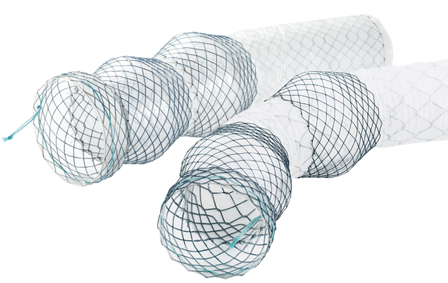
Esophageal Niti-S™ Self-Expandable Metal Stents
In the ever-evolving landscape of medical technology, innovations continue to redefine the way we approach and treat various health conditions. One such groundbreaking advancement in the field of gastroenterology is the Esophageal Niti-S™ Self-Expandable Metal Stents (SEMS). These stents have proven to be a game-changer in the management of esophageal disorders, offering a minimally invasive and effective solution for patients facing challenges such as strictures, tumors, or other obstructive conditions.
Understanding Esophageal Niti-S™ Self-Expandable Metal Stents:
Esophageal Niti-S™ SEMS are tubular devices made from a combination of nickel and titanium alloys. The unique properties of these alloys allow the stents to be self-expandable when deployed within the esophagus. This characteristic is particularly advantageous in the context of treating esophageal strictures, as the stent can conform to the shape and size of the narrowed passage, providing immediate relief and restoring proper functionality.
Key Features and Design:
The design of Niti-S™ SEMS incorporates a braided structure, ensuring flexibility and adaptability to the dynamic environment of the esophagus. The stents are often covered with a silicone membrane to prevent tissue ingrowth and migration, further enhancing their long-term efficacy. This combination of materials and design principles contributes to the stents’ durability and ability to withstand the peristaltic movements of the esophagus.
Clinical Applications:
Esophageal Niti-S™ SEMS find applications in a variety of clinical scenarios, with their primary use being in the management of benign and malignant esophageal strictures. Benign strictures may result from conditions such as gastroesophageal reflux disease (GERD), while malignant strictures are often associated with esophageal cancers. The deployment of these stents can provide immediate relief by effectively widening the narrowed esophageal lumen.
In addition to strictures, Esophageal Niti-S™ SEMS are also utilized in the palliative treatment of esophageal tumors. By relieving obstruction caused by tumors, these stents improve patients’ quality of life and facilitate easier swallowing, reducing the impact of dysphagia.
Advantages Over Traditional Treatments:
Compared to traditional treatments such as balloon dilation or surgical intervention, the use of Esophageal Niti-S™ SEMS offers several advantages. Firstly, the minimally invasive nature of stent placement reduces the risks associated with surgery and accelerates the patient’s recovery. The procedure can often be performed on an outpatient basis, minimizing hospital stays and associated costs.
Moreover, the adaptability of the stents to the esophageal anatomy ensures a more precise and tailored solution for each patient. This personalized approach not only enhances the effectiveness of the treatment but also reduces the likelihood of complications.
Long-Term Outcomes and Considerations:
While Esophageal Niti-S™ SEMS have demonstrated impressive short-term outcomes, it is crucial to consider their long-term efficacy and potential complications. Studies have shown that these stents can effectively maintain esophageal patency for extended periods, offering a durable solution for patients with both benign and malignant conditions.
However, complications such as stent migration, tissue ingrowth, and the development of gastroesophageal reflux symptoms are important considerations. Regular follow-up assessments and monitoring play a pivotal role in addressing and mitigating potential issues, ensuring the ongoing success of the treatment.
Conclusion:
As with any medical intervention, a comprehensive understanding of the patient’s condition, thorough evaluation, and ongoing monitoring are essential components of successful treatment. Esophageal Niti-S™ SEMS showcase the potential to transform the landscape of esophageal health, offering a ray of hope for individuals seeking effective and less invasive solutions to their medical challenges.
The advent of Esophageal Niti-S™ Self-Expandable Metal Stents represents a significant milestone in the management of esophageal disorders. Their innovative design, combined with the advantages of minimally invasive procedures, provides a promising solution for patients facing strictures and obstructive conditions.
